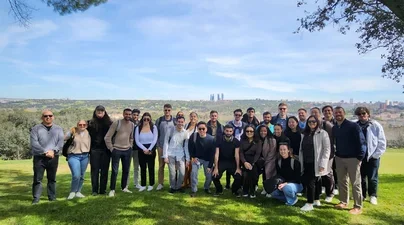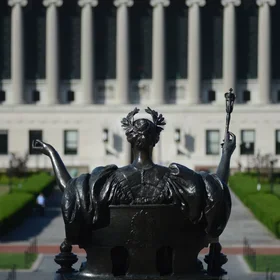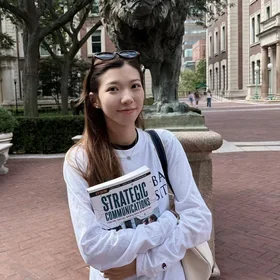By Marissa Fabian (’25SPS, Sports Management)
There is no better teacher than experience, especially when it comes to understanding the business of the world’s dominant sport: football (soccer, to those in the United States). This spring break, as part of the Sports Management program’s collaboration with Universidad Europea Real Madrid, my classmates and I spent a week in Madrid immersing ourselves in the rich history and culture of football that is deeply embedded in the city.
The relationship between the program and Real Madrid opened several doors that led to once-in-a-lifetime learning experiences. We interacted with professionals from Real Madrid’s partnerships, creative content, strategy, and business operations departments, gaining practical insights into the inner workings of the club. To top that off, we attended a Real Madrid match at the Santiago Bernabéu Stadium and toured their massive Ciudad training complex. This gave us an unparalleled perspective on one of the world's biggest sport properties.
We also toured Civitas Metropolitano, home to Atlético Madrid, a club often seen as the passionate working class underdog to Real Madrid's old money and success, much like the Mets to the Yankees in New York. Experiencing the contrasting atmospheres of these two stadiums offered a glimpse into the hearts of Madrid's fiercely loyal fans.

Sports Management students and program team at Club de Campo Villa de Madrid.
Saving the best for last, we toured the headquarters of Spain’s top fooball division, La Liga. The visit provided a look inside one of the most successful and lucrative football leagues in the world. With the 2026 FIFA World Cup on the horizon, its final match set for MetLife Stadium, La Liga touched upon their strategy to capture more market share across the Americas. The trip highlighted a contrast between the global sports industry's mindset and the more commercially-driven American approach. Personally, this sparked reflection on the future landscape of sports, both domestically and internationally.
While football reigns supreme in Madrid, our exploration extended beyond the Bernabéu. Real Madrid also boasts an emerging basketball team that trains at their impressive Ciudad complex. Their home court, the WiZink Center, attracted a vibrant crowd on the Sunday afternoon we attended, showcasing another facet of Madrid's sporting scene. Next, we traded sightseeing for sweat at Ciudad de la Raqueta, Madrid's largest padel and tennis complex. This, one of our most enjoyable experiences, offered a hands-on introduction to the rapidly growing sport of padel, a social and dynamic game that blends aspects of tennis and squash. The walls become part of the game, making for thrilling rallies.
To end our trip, we got the best views of the city at Club de Campo Villa de Madrid, a historic golf, tennis, and padel club. This prestigious club, where renowned golfers like Jon Rahm hone their skills, welcomed us with hospitality during our visit.
I give a huge thank you to Columbia University Sports Management for this incredible trip. Witnessing the passion, strategy, and innovation of major global sports properties firsthand has deepened my understanding of this ever-evolving industry. I'm excited to see how these properties continue to push boundaries and captivate audiences around the world in the years to come.
About the Program
The Columbia University M.S. in Sports Management provides students with a comprehensive curriculum and access to sports industry practitioners and influencers. Students acquire skills in areas such as entrepreneurship and innovation, global sports management, facility and event management, and sports law and ethics.


